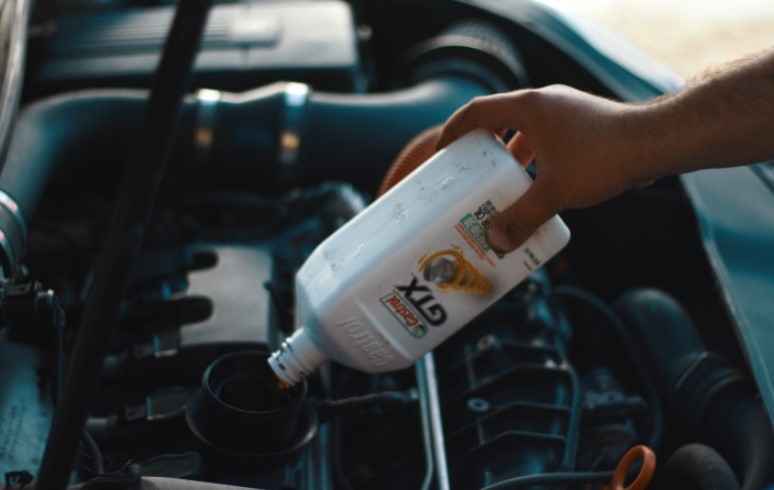Last Updated on October 15, 2023 by Alex PT
Using racing fuel, like high-octane race gas (e.g., 100+ octane), in a typical street car can lead to improved performance. It can increase horsepower by up to 5-10%, but it’s costly and unnecessary for most daily driving due to its high price
How the Racing Fuel Can Affect a Normal Street Car
- Increased Performance
Racing fuels hold a higher octane level than normal petrol, resulting in a more potent combustion practice. In turn, this leads to increased power output from the street car’s engine. Nevertheless, this could predominantly benefit only those vehicles whose engines are tuned to accommodate a higher amount of octane.
- Improved Engine’s Longevity
Racing fuels are specially designed to resist the extreme conditions of racing. While most street cars may not be subjected to such harsh conditions, using high-quality racing fuel can enhance the engine’s lifespan by providing additional protection against wear and tear.
- Potential Damage to the Engine
Conversely, unless a street car’s engine is designed or adjusted to burn high-octane fuel, it may not handle the heat and pressure generated by the combustion of racing fuel. This might lead to potential damage like detonation or engine knocking – a damaging condition where fuel burns unevenly within the engine.
- Exhaust Issues
Racing fuels can produce different byproducts when burned compared to regular fuel. Some of these byproducts could pose a problem for a street car’s emission control system, possibly causing blockages or damage to the catalytic converter.
- Increased Fuel Consumption
Racing fuels burn at a faster rate than their regular counterparts. This means that a street car using racing fuel may exhibit increased fuel consumption, leading to more frequent pit stops for refueling and thus increasing the running costs.
- Legal and Environmental Considerations
In many jurisdictions, racing fuels are not legal for use in regular street cars due to their environmental impact. Misuse could result in fines, penalties, or vehicle impoundment.
In conclusion, the impact of racing fuel on a regular street car may not always be beneficial. Caution is advised for car enthusiasts who might be considering this transition.
Understanding the Racing Fuel
Racing fuel releases a higher amount of energy than standard pump gasoline. It has a higher octane rating to prevent knocking, and it also contains more oxygen than gasoline so that it can be burned more completely. This fuel is also highly volatile, meaning it evaporates quickly. All of these properties allow racing engines to make more power than street car engines.
Comparison of Regular and Racing Fuel
| Characteristic | Regular Fuel (Typically 87-Octane Gasoline) | Racing Fuel (High-Octane) |
|---|---|---|
| Octane Rating | Typically 87 octane | 100+ octane (varies) |
| Price | Lower cost per gallon | Significantly higher cost |
| Engine Performance | Moderate power output | Enhanced power output |
| Combustion Efficiency | Adequate for daily driving | Optimized for high RPMs |
| Fuel Efficiency | Standard fuel efficiency | May be lower |
| Engine Compatibility | Suitable for most street cars | Specialized for racing |
| Emissions | Meets emission standards | May produce higher emissions |
| Availability | Widely available | Limited, mainly at race tracks |
| Legal Restrictions | None | Restricted for on-road use |
| Use Case | Everyday commuting and driving | High-performance racing |
Understanding Your Car’s Engine and the Right Fuel

Your car’s engine is designed to run on a specific fuel type. That doesn’t mean, however, that it can’t run on other fuel types. You may improve your car’s performance by using a different fuel type. Here’s what you must know about racing fuel in a street car.
- Racking up the miles with racing fuel will not damage the vehicle if the car is driven for short distances and then refueled with regular gasoline.
- The octane level of race gas (which has been diluted with oil) may cause timing issues and excessive pre-ignition under normal driving conditions, resulting in a loss of power or an increase in exhaust emissions.
- Using lower octane fuels for daily driving might improve engine efficiency due to increased air intake temps and reduced knock resistance (due to more volatile hydrocarbons).
- It’s best not to use race gas as the sole fuel source unless you are preparing for a competition or have been advised by a professional mechanic or engineer.
What Fuel is Best Suited for Your Car?

Most current cars are designed to run on unleaded gasoline. Leaded gasoline was phased out in the 1970s due to health and environmental concerns. But racing fuel is still made with lead, and it’s often used in high-performance cars. So, what would happen if you put racing fuel in a normal street car?
The answer is that there isn’t any reason to do this. You’re unlikely to get a significant increase in horsepower or an increased gas mileage rate, but there could be adverse effects. The most obvious effect of putting racing fuel into your street car is that your engine will wear out quicker than it would have otherwise. It will also cause more pollution than it usually does and create more engine noise since racing fuel burns at a higher temperature than standard gasoline.
The Difference Between Regular and Racing Fuel

Most people don’t realize there is a big difference between the fuel used in regular cars and the fuel used in race cars.
- For one, racing fuel is highly refined and has no impurities that regular fuel does. This means that it burns cleaner and provides more power to the engine.
- Additionally, racing fuel has a higher octane rating than regular fuel, which means it can withstand higher temperatures without detonating.
- Finally, racing fuel is more expensive and contains less energy per gallon than regular gas. Hence, racers usually try to save as much as possible by using it sparingly and only when necessary.
Properties of Racing Fuel
Racing fuel is designed to release a high amount of energy very quickly. It typically has a higher octane rating than pump gas and contains more oxygen. This allows it to burn hotter and produce more power. However, racing fuel is also more corrosive and can damage engine components if used for extended periods.
In addition, it doesn’t contain any lubricants that help the engine run smoothly over long distances or maintain proper temperatures. If mixed with gasoline in small amounts (20%), race fuel can increase horsepower and torque, which would undoubtedly satisfy most racers’ needs.
A car running on this fuel type may require less maintenance over time because there are no deposits left on the piston heads due to combustion. On the other hand, this fuel could reduce your vehicle’s efficiency by as much as 25%. If you plan on using race fuel often in your street car, you’ll need to have some plan for future repairs that could cost up to $2,000-5,000!
Properties of Regular Fuel
Most regular unleaded gasoline has an octane rating of 87. This means that it will start to detonate or knock at that temperature. The higher octane rating means knocking will occur at a higher temperature. Racing fuel is designed to resist knocking under high compression conditions. It typically has an octane rating in the mid-90s.
So, what would happen if you put racing fuel in your street car?
The higher-octane rating would allow the engine to run hotter without knocking, leading to increased power output. However, it’s important to note that most street cars are not designed to take advantage of this increase in power.
What is the Side Effect of Using the Wrong Fuel?
Using the wrong fuel in a car can have various detrimental side effects, depending on the type of fuel and the vehicle’s engine. Here are some common consequences:
- Engine Damage: If you put gasoline in a diesel engine or vice versa, it can lead to significant engine damage. Diesel engines rely on compression ignition, while gasoline engines use spark ignition. Using the wrong fuel can disrupt the engine’s combustion process, potentially causing piston and cylinder damage.
- Reduced Performance: The wrong fuel can result in decreased engine performance, including reduced power output, poor acceleration, and lower fuel efficiency. This is because the engine’s computer system is not optimized for the incorrect fuel type.
- Engine Knocking and Pinging: The wrong fuel can cause knocking and pinging sounds in the engine, indicating incomplete combustion. This can damage the engine over time and lead to costly repairs.
- Clogged Fuel System: Using the wrong fuel can clog the fuel system, including the fuel lines, injectors, and filters. This can disrupt fuel flow and lead to poor engine operation.
- Emission Issues: Incorrect fuel usage can increase emissions, leading to a higher environmental impact. This can result in the vehicle failing emissions tests and contributing to air pollution.
- Stalling and Starting Issues: Putting the wrong fuel in your car can cause it to stall or have difficulty starting. This can be inconvenient and potentially leave you stranded.
- Costly Repairs: Repairing the damage caused by using the wrong fuel can be expensive, involving engine repairs or even engine replacement in severe cases.
- Voided Warranty: Using the wrong fuel may void your vehicle’s warranty if the manufacturer determines that the damage resulted from this error.
The Importance of Using the Right Fuel
You’re not alone if you’ve ever wondered how racing fuel would affect a normal street car. It’s a common question and one that has some misconceptions surrounding it. First and foremost, it’s essential to understand that there are different types of racing fuel.
The fuel used in Formula One is very different from the fuel used in drag racing. There are also other types of fuels used for rallying or drifting. Using the wrong fuel can destroy or affect the efficiency of your engine.
Related Article: Is Mazda Miata A Sports Car? (All You Need To Know!)
Final Thoughts
Theoretically, racing fuel should make your car faster. After all, that’s what it’s designed for. However, there are downsides to using it in a street car. First, it’s more expensive than regular gas. Second, it can damage your engine if you don’t tune your car to run on it properly. And finally, it can be tough to find if you don’t live near a race track or specialty shop. So, if you’re considering using racing fuel in your street car, weigh the pros and cons carefully.
Reference 1: https://www.hsoil.com/is-it-safe-to-put-racing-fuel-in-my-normal-car.html#:
Reference 2: https://flowracers.com/blog/racing-fuel-in-normal-car/

Hi! I’m Alex PT. I hold a Bachelor’s degree in Sports Management from Indiana University and have over seven years of valuable experience working in a Sports Event Management Company. I founded SportBlurb with the passion for bringing you the latest, most insightful, and engaging content in the world of sports. So, whether you’re a die-hard fan or want to stay informed, I’ve got you covered!

